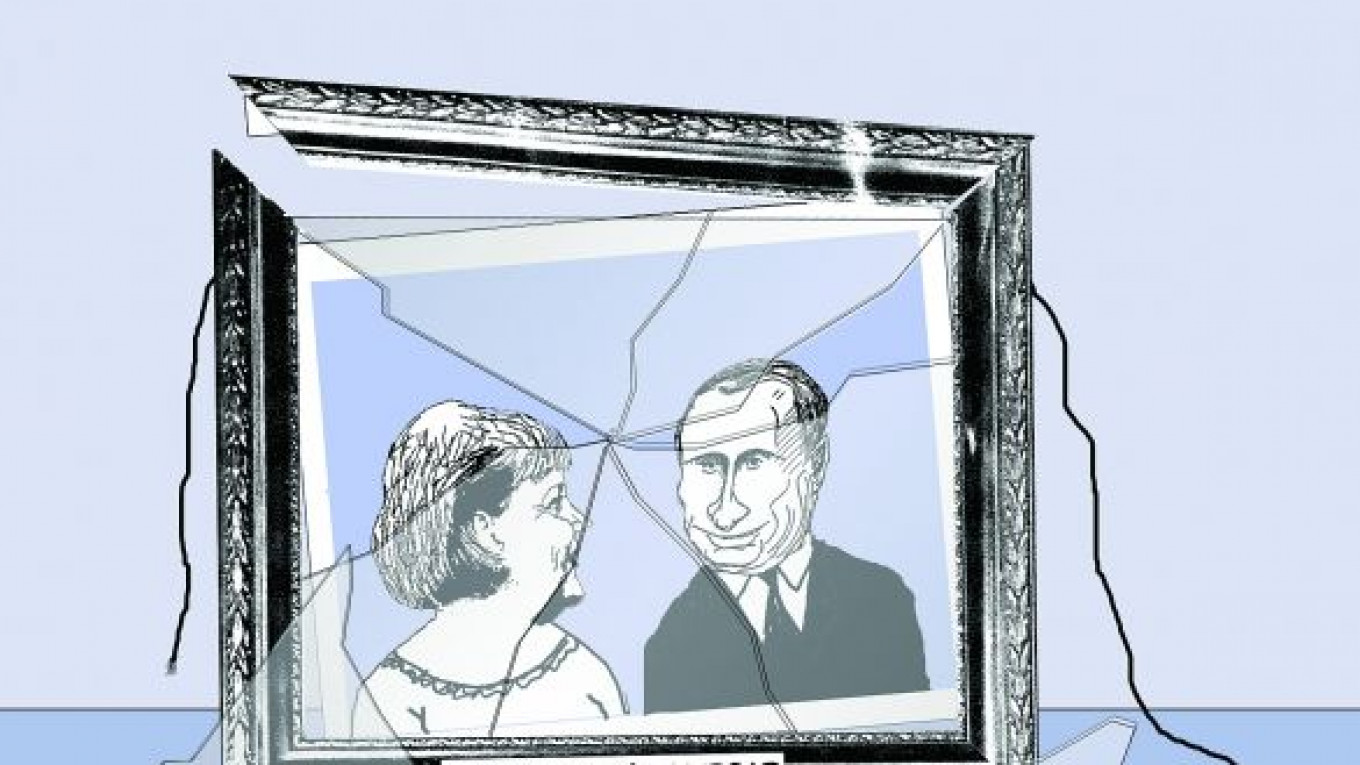German-Russian relations do not qualify as a strategic or modernization partnership. The relations have turned from closeness and cordiality to disillusionment and disappointment. We saw ample evidence of this last week at the 12th annual round of the German-Russian civil society forum, or the Petersburg Dialogue, and the 14th round of inter-governmental consultations held simultaneously in Moscow.
It was a foregone conclusion that the meetings, including the talks on Friday between President Vladimir Putin and German Chancellor Angela Merkel, would be more strained than ever.
German politicians are becoming more worried about Russia's slide toward authoritarianism,? attempts made to reassert Russian control over other former Soviet republics and the Kremlin's more assertive foreign policy.
This concern was clearly expressed in a Nov. 9 resolution passed by the German parliament titled "Strengthening Civil Society and the Rule of Law in Russia Through Cooperation." It was timed to be ready before the Petersburg Dialogue and to support the government in helping to persuade the Kremlin to change course.
Participants in the dialogue on both sides and at all levels were anxious to see how Merkel would handle the issue in her talks with Putin, including any of the 17 recommendations that the German parliament had formulated for the government to take into consideration.
The parliament wanted Merkel to reassert Germany's commitment to the "modernization partnership" with Russia but at the same time stress that such a partnership should not be limited to economic and high-tech matters. It should also include the promotion of democracy, human rights and a law-based state, the active engagement by the citizenry and the rise of a broad middle class.
In the analytical part of the resolution, the German parliament noted that under Putin, "legislative and legal measures have been taken that are aimed at widening control of active citizens, criminalizing critical engagement and pursuing a confrontational line against government critics." ?
How, then, did Merkel respond to the parliament's recommendations? She failed to embark on direct criticism of Putin or engage in a comprehensive condemnation of the system he has created in Russia. Typically, her approach was balanced, assuring Putin that she considered the German-Russian relationship to be characterized by friendship and partnership. Merkel also said Germany wanted Russia to be successful, but clarified that "our friendship will not grow if we sweep everything under the rug."
In her view, the things that should be cleared up were precisely some of the issues that the German parliament had raised, including the requirement that nongovernmental organizations that receive funds from abroad register as "foreign agents," the law on treason and the harsh sentence that two members of the Pussy Riot punk band received.
Predictably, Putin responded to Merkel's criticism with a mixture of irritation and denial. He also leveled countercharges at what he considered to be civil and human rights violations in Germany.
Earlier, Kremlin spokesman Dmitry Peskov chimed in, deploring the "anti-Russian rhetoric" in Germany. Russia's ambassador in Berlin, Vladimir Grinin, said the German parliament's resolution was "not constructive," and a spokesman for the Foreign Ministry even stated that, in view of a "plethora of slanderous statements" by Andreas Schockenhoff, deputy head of the Conservative Party's parliamentary group and author of the parliament resolution critical of Russia, Schockenhoff would no longer be regarded as an "official person with the authority to express the view of the federal government." Indeed, the Russian participants in the Petersburg Dialogue acted as if Schockenhoff did not exist.
The more frigid atmosphere in German-Russian relations had been highlighted earlier, when Putin visited Berlin on June 1. In contrast to his previous visits in Germany, Putin stayed only six hours in Berlin, sandwiched between an earlier stopover in Minsk and the next stop in Paris.
The meetings in Moscow last week were equally brief. They included talks with eight German government ministers, three secretaries of state and several high-ranking representatives of German business with their Russian counterparts. They also included conversations between Putin and Merkel privately and in the plenary meeting and a reception at the German embassy. All of this was wrapped up in half a day.
In the end, it is doubtful that Putin got the point. German leaders are increasingly adopting the position that Russia is heading in the wrong direction, which makes it difficult to develop a true strategic or modernization partnership between the two countries.
Hannes Adomeit teaches EU-Russian relations at the College of Europe's Natolin? campus in Warsaw.
A Message from The Moscow Times:
Dear readers,
We are facing unprecedented challenges. Russia's Prosecutor General's Office has designated The Moscow Times as an "undesirable" organization, criminalizing our work and putting our staff at risk of prosecution. This follows our earlier unjust labeling as a "foreign agent."
These actions are direct attempts to silence independent journalism in Russia. The authorities claim our work "discredits the decisions of the Russian leadership." We see things differently: we strive to provide accurate, unbiased reporting on Russia.
We, the journalists of The Moscow Times, refuse to be silenced. But to continue our work, we need your help.
Your support, no matter how small, makes a world of difference. If you can, please support us monthly starting from just $2. It's quick to set up, and every contribution makes a significant impact.
By supporting The Moscow Times, you're defending open, independent journalism in the face of repression. Thank you for standing with us.
Remind me later.


